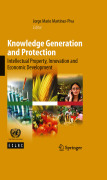
Knowledge generation and protection: intellectual property, innovation and economic development
Martínez-Piva, Jorge Mario
The wealth of the most developed nations, and, to a large extent their economic growth, can be explained by the capacities to generate research, create knowledge, appropriate it and transform it into new technologies. The study of the dynamics and contemporary mechanisms for the circulation, access, and commercial application of knowledge is an urgent task, since the capabilities related to technological change appear increasingly to be the path for developing countries to move away from their condition on the periphery. Knowledge Generation and Protection, showcasing research from academics, policymakers, and consultants, offers an analysis of three fundamental topics. The first is whether strengthening protection of intellectual property encourages or hinders technological learning and innovation in the developing countries. The second addresses the way in which knowledge is generated and how it is transformed into useful technology for the market, that is, how national innovation systems work. The third is the role of public policy as an instrument for innovation and for regulating intellectual property. Chapters explore the relationships among intellectual property, innovation, economic development, and policy in depth, with particular attention to such emerging topics as the impact of trade agreements on intellectual property rights and sensitive issues for developing countries such as access to medicines, and protection of biological diversity, livingorganisms, and traditional knowledge. Several chapters focus on Mexico, whichserves as an important example as the only developing nation that is a memberof OECD and has a rich history of industrial policy, science and technology policy, and trade openness. The concluding chapter argues that if developing countries seek to develop dynamic competitiveness based on knowledge and innovation in the present context of rigorous intellectual property regulations, theyshould take a leap in their science and technology policies to take advantageof the growing world market and open up long-term development paths. Exploresthe dynamic relations among intellectual property rights, international trade, innovation, economic development, and science and technology policy Covers such timely issues as access to medicines, and protection of biological diversity, living organisms, and traditional knowledge Applies in-depth analysis of Mexico to apply to developing countries, in general Sponsored by the Economic Commission for Latin America and the Caribbean (ECLAC) and featuring contributions from academics, policymakers, and consultants INDICE: Intellectual Property and Development: an Interpretation of the (New) Markets for Knowledge.- Protection of Intellectual Property Rights, Innovation and Development.- The Flexibility of TRIPS and Their Possible Erosion in Bilateral, Multilateral and Regional Negotiations.- Intellectual Property and the New Generation of Free Trade Agreements: the Agreement between Chile and the United States of America.- Free Trade Agreements and Intellectual Property:Impacts and Challenges.- Intellectual Property Rights in the Agenda of the Developing Countries: Intellectual Property Laws and Access to Medicines.- Intellectual Property Rights and Biological Diversity: Considerations for Latin America.- Intellectual Property in Living Organisms: Current Situation, Trends and Challenges.- Premises and Instruments of Innovation Policy: a Reflection from the Mexican Case.- Recent Changes in Science and Technology Policy in Mexico: Innovation Incentives.- Scientific and Technological Policy in Mexico and Intellectual Property.- General Conclusions.
- ISBN: 978-1-4419-1263-3
- Editorial: Springer
- Encuadernacion: Cartoné
- Páginas: 322
- Fecha Publicación: 12/08/2009
- Nº Volúmenes: 1
- Idioma: Inglés
